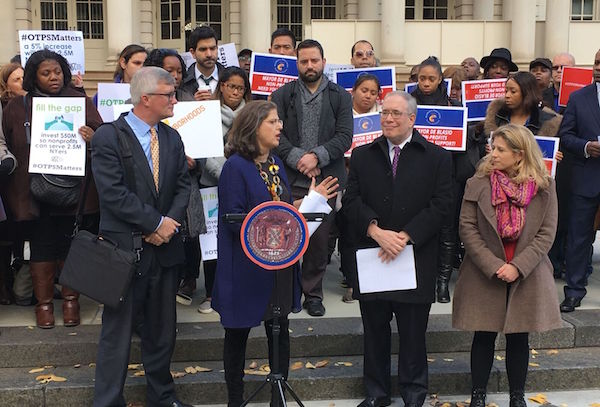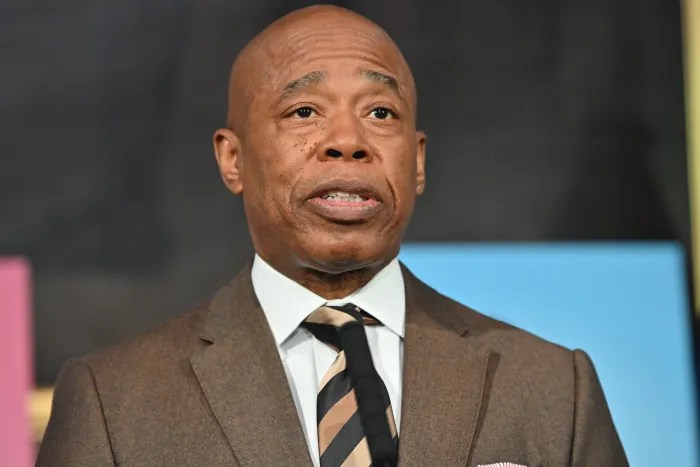
BY JACKSON CHEN | Nonprofit contractors doing business with New York City and their key ally in the City Council, Helen Rosenthal, have renewed the push for more funding after their request for dollars to cover the costs of things like rising rent, equipment purchases, and capital repairs were excluded from the 2017-2018 fiscal budget. This time, they’ve doubled down on their initial demand and are requesting an additional $50 million for nonprofits in the city’s budget.
The nonprofit community first made its budget concerns vocal during a May rally outside City Hall urging Mayor Bill de Blasio to up their funding. At that time, Rosenthal, who represents the Upper West Side, was joined by several of her fellow councilmembers in requesting a 2.5 percent increase, or $25 million, in the city’s budget to cover “other than personnel services” costs, or OTPS, borne by nonprofits with city contracts. While staff salaries take up a majority of such organizations’ expenses, everything else — like rents, supplies, and technology expenses — is categorized as OTPS.
“We’re trying to strategically get a jumpstart on what’s going on,” Rosenthal said, reflecting the disappointment with the budget adopted this past summer as well as apprehension about the political upheaval in Washington. “Before we were saying let’s do a 2.5 percent increase on the OTPS, but now we’re saying let’s make it a five percent increase. Thinking ahead with the additional work they’ll more likely be asked to do with larger cuts in federal funding, we need to shore up the nonprofits.”
While unsuccessful in the 2017-2018 budget adopted on July 1, the nonprofit community continues to press its case, holding another OTPS rally on December 1 to reignite focus on the issue with the hope of influencing the mayor’s preliminary budget, due to be released in January.
“We fund [nonprofits] at 80 cents on a dollar, so they go out to private philanthropy where private investors want to spend money on new technology or a project,” Rosenthal said. “Instead, the philanthropy is having to pay for toilet paper, increased costs of food, increased costs of rents, and it shouldn’t be that way.”
Rosenthal and nonprofit leaders were joined on City Hall’s steps last week by City Comptroller Scott Stringer and East Side State Assemblymember Brian Kavanagh.
“Nonprofit human service organizations are the backbone of our city’s social safety net,” Stringer said in an email message.“They provide essential, often lifesaving services, to our city’s most vulnerable residents. These organizations are working on behalf of city government, and frankly, they’ve been doing it with inadequate funding for many years.”
The comptroller added, “And when OTPS is underfunded, these organizations are forced to make devastating decisions. Like choosing between buying supplies for their youth program, or paying that month’s utility bill – it’s just not right.”
Allison Sesso, the executive director of the Human Services Council, an umbrella organization that represents non-profits, said the groups have been struggling for years and the latest budget exclusion was frustrating.
“We were asking for it to be in last year’s budget, which would’ve meant we got a 2.5 percent increase,” Sesso said. “Since they didn’t include that in the budget, we’ve increased the ask because we know inflation continues to erode our costs, so now we’re saying let’s add for the two years together.”
Even with that, Sesso stressed that the five percent wasn’t even close to addressing the underfunding of nonprofits through city contracts, nor does it fix the competitive procurement process in which the organizations vie for contracts.
“We’re not actually at this moment asking for the perfect process,” Sesso said. “We’re saying we’re at a breaking point, and we’re asking for a relatively small adjustment to address this broken system.”
According to Urban Pathways, a homeless and housing nonprofit with locations throughout the city, the problem facing nonprofit service providers is based on the law of supply and demand. The organization’s chief operating officer, Ronald Rosado Abad, said that with operating expenses rising each year, fixed levels of funding in city contracts squeeze their ability to provide the services needed.
“All the not-for-profits have this challenge of managing the budgets within these constraints but the demand for our services continues to increase,” Abad said. “The demand is increasing but the supply is not.”
Urban Pathways’ director of policy, Nicole Bramstedt, said that stretching the organization’s budget leaves it in a difficult bind when approaching private donors. Nonprofits typically rely on some level of private funding, but oftentimes donors are looking to support programs that can show results in the community – not the far less appealing categories of rent, supplies, and equipment.
Abad said even the five percent increase is barely a sliver of the city’s more than $80 billion budget. The minor bump in funding, he said, would leave nonprofit city contractors in much better shape.
The mayor and his office haven’t completely turned a blind eye to the nonprofits’ situation. In September, de Blasio launched the Nonprofit Resiliency Committee meant to promote collaboration between city agencies and nonprofits. According to Jessica Ramos, a spokesperson for de Blasio, the committee would explore issues of “organizational infrastructure, including OTPS, collaborative service design, and streamlining administrative processes.”
In an email message, Ramos added, “The Nonprofit Resiliency Committee coordinates with mayoral offices to address priorities of the sector and identify solutions. The Committee has been productive in identifying priorities and is developing work plans to create and implement solutions.
According to Sesso, however, the mayor’s office has yet to offer any commitments regarding the request for $50 million in OTPS funding the organizations are seeking.
“On one hand, we want to recognize they put this group together,” Sesso said of the mayor’s new committee. “On the other hand, that’s all well and good, but we also need to see this investment and we want to make a case for why it’s important to have this investment.”






































